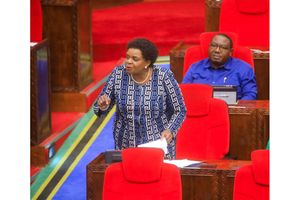Job cuts loom ahead of pension funds merger

Social Security Regulatory Authority (SSRA) director general Irene Isaka
What you need to know:
Senior managers and operations staff will be hit the hardest as they are likely to be assigned other duties or laid off if the Bill is passed by Parliament and signed into law by the Head of State.
Dar es Salaam. Job cuts look imminent in the social security sector following the drafting of a bill that seeks to merge four funds into one.
Senior managers and operations staff will be hit the hardest as they are likely to be assigned other duties or laid off if the Bill is passed by Parliament and signed into law by the Head of State.
Among these who will be affected are the directors general of the four funds, boards of directors and heads of various directorates and departments. If the Bill is passed and signed into law, the resultant Public Service Social Security Fund Act will repeal the laws that established the Public Service Pensions Fund (PSPF), Government Employees Provident Fund (GEPF), LAPF Pensions Fund and PPF Pensions Fund.
These will be merged to form the Tanzania Public Service Social Security Fund (TPSSF), a behemoth with over Sh5 trillion in assets.
Under the new setup, public employees who were contributing members of the National Social Security Fund (NSSF) will be transferred to TPSSF.
Private sector employees currently contributing to the PPF Pensions Fund will be transferred to NSSF, which will solely cater for private sector workers.
According to the Integrated Labour Force Survey 2016 conducted by the National Bureau of Statistics (NBS), Tanzania had 2.3 million salaried workers, out of whom 1.6 million were in the private sector and 700,000 in the public sector.
Social Security Regulatory Authority (SSRA) director general Irene Isaka told The Citizen earlier this week that the proposed changes were based on evaluation conducted by SSRA in response to proposals by trade unions.
She confirmed that there could be “some” job losses due to the scope of changes to be undertaken.
“The fate of employees of the four pension funds will be known in the weeks to come,” Ms Isaka said, adding that board members and directors general may be assigned other duties in public service.
She did not specify the extent of job losses, but said measures would be taken to keep any layoffs to a minimum.
“This sector still needs more workers, so we will go out of our way to safeguard the interests and welfare of the affected funds’ employees once the new law is enacted.”
Ms Isaka said the President’s Office, Public Service Management, and Prime Minister’s Office (Labour) were working on the structure of the two funds that would cater for public and private sectors. “After the law is enacted and structures are in place, it will be the right time to talk about structural changes.” Ms Isaka reiterated, however, that job losses would not be substantial as there were funds that had bloated workforces, while others were grappling with an acute shortage of manpower.
Commenting on the matter, Mr Christian Gaya, managing director of HakiPension, a non-profit organisation advocating the right to social security, said job losses were inevitable if the four funds were merged. He also said that efficiency and service delivery could be affected further.
“The social security sector is currently fraught with challenges, including long delays in paying members. Imagine what will happen when there will be only two funds operating,” Mr Gaya said.
A study by the International Labour Organisation last year revealed that the cost of operating social security funds was relatively high in Tanzania.
High running costs were affecting the funds’ ability to offer quality services, the report added.




